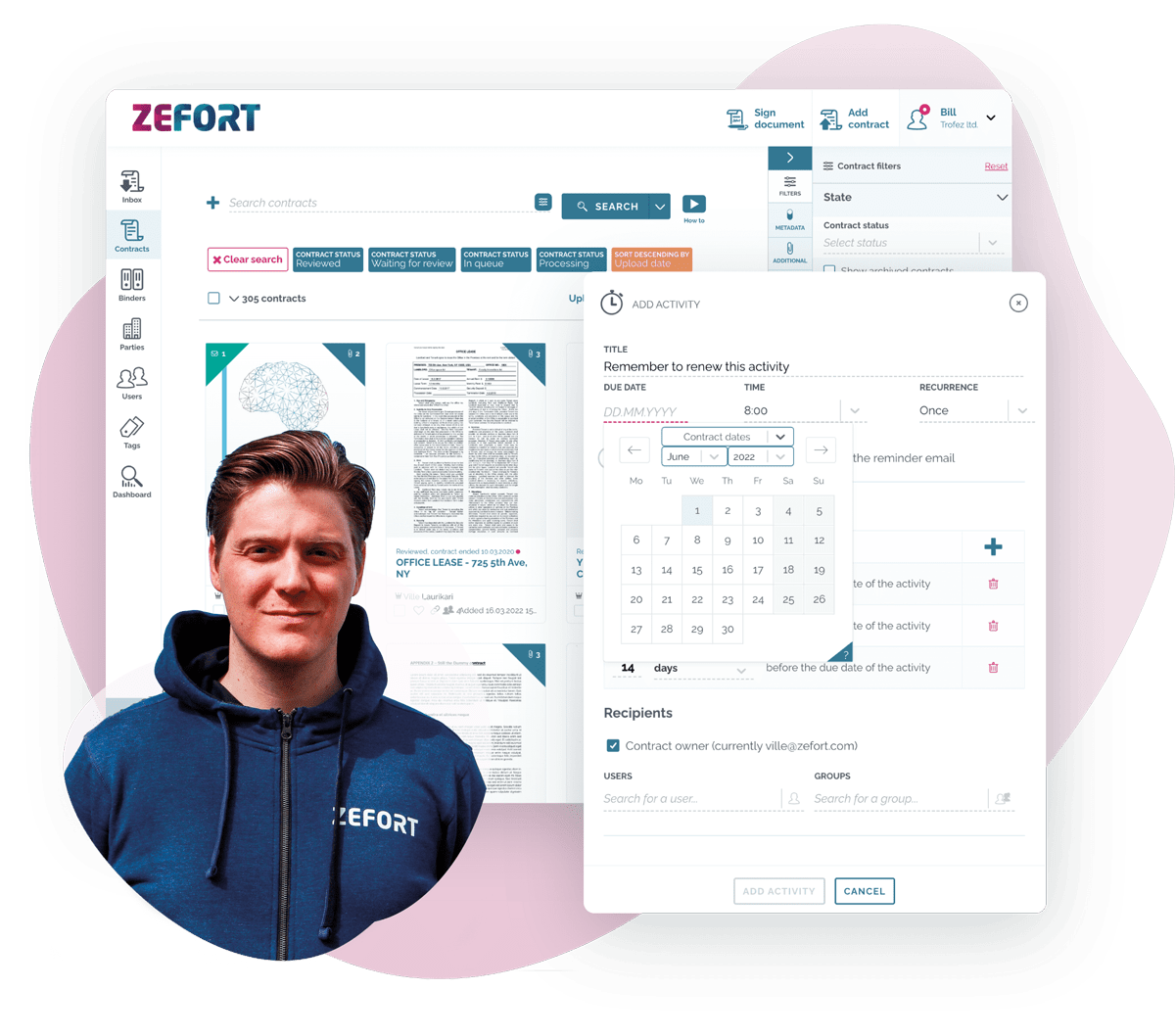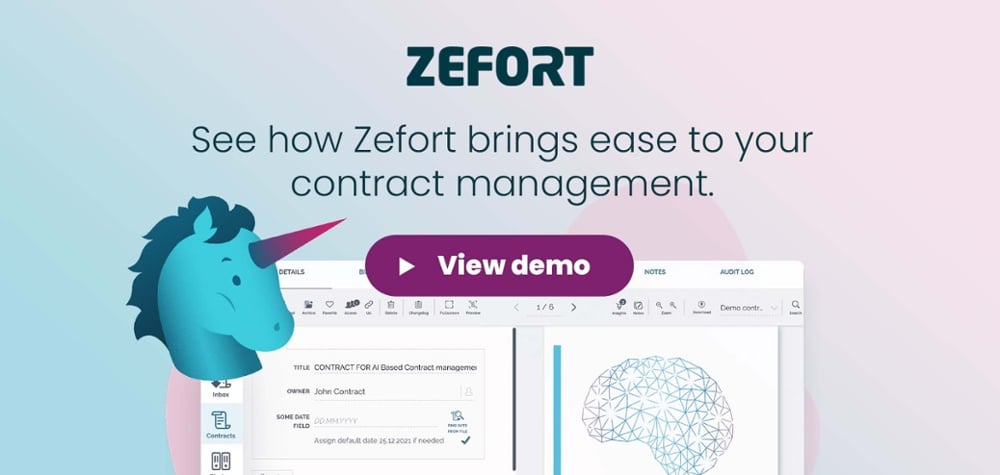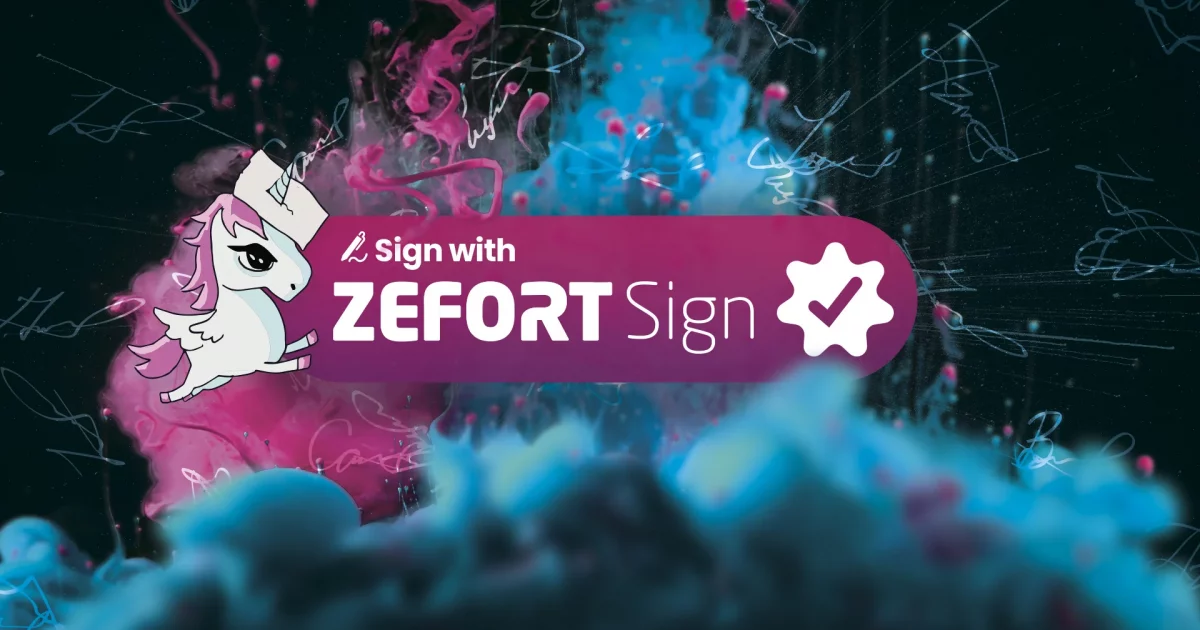From Chaos to Control: How Contract Management Software Simplifies Your Company Processes
Have you ever felt like maintaining contracts and keeping track of their renewals is a complex and time-consuming task? Managing contracts can quickly get out of hand, leading to chaos and confusion in your organization. But fear not – technology has the solution to your problems. With contract management software, you can simplify your company processes and regain full control of your contracts. Let’s delve deeper into how these kinds of software can help your business thrive!
What is Contract Management Software?
Contract management software is a tool used to streamline the creation, negotiation, approval, and post-sign management of contracts.
It allows businesses to effectively manage contracts across the entire lifecycle, from initial request through to signature and beyond.
This software automates many of the important tasks associated with contract management, including version control, document storage, and reporting.
By using contract management software, businesses can reduce risks, improve compliance, and increase efficiency.
Contract management software also helps businesses to better manage their relationships with suppliers, vendors, and other stakeholders, leading to improved collaboration and communication.
Benefits of Contract Management Software
Improved Efficiency and Productivity
Improved efficiency and productivity are among the top benefits of using contract management software. This is because it automates many of the manual processes that were previously time-consuming and prone to human errors. Here’s how contract management software can improve efficiency and productivity in your company:
- Automated contract creation and approval processes can save time and reduce errors.
- Centralized contract storage ensures that all contract-related information is easily accessible for everyone involved in the process.
- Easy-to-use search features allow you to find the contracts you need quickly and reliably.
- Customizable workflows and notifications ensure that everyone involved in the contract management process is informed of their responsibilities, deadlines, and progress.
- E-signature functionalities enable contracts to be signed online, speeding up the signing process and eliminating the need for paper-based signatures.
All of these features help to simplify the contract management process, improving efficiency and productivity. With less time spent on manual processes, employees can focus on more value-added tasks.
Reduced Costs and Risks
Contract management software can help businesses reduce costs and risks in several ways. One of the most significant benefits is that it automates contract tracking, which saves businesses time and money. By using modern contract management tools, businesses can eliminate manual processes, such as searching for contracts in filing cabinets.
Additionally, contract management software can help businesses identify issues that are often overlooked, such as contract renewal dates. By keeping track of these dates, businesses can avoid the high costs that come with missed deadlines. Likewise, the software can alert the right people when contracts are expiring, which gives the contract owners enough time to renegotiate or find better deals.
Contract management software can also help businesses reduce risks by providing them with a centralized, cloud-based, location to store all their contracts. This means that businesses can easily access and review contracts whenever they need to, reducing the risks associated with lost or misplaced contracts. Additionally, the software can help businesses ensure that they are complying with all relevant policies and regulations.
Finally, the software can help businesses minimize the risks associated with contract disputes. When contracts are managed manually, disputes are more likely to arise because key terms and conditions may be overlooked. In contrast, when using contract management software, contracts are easily accessible, and key terms and conditions are highlighted, making it easier to resolve disputes.
By reducing costs and risks, contract management software can help businesses operate more efficiently and effectively, which ultimately leads to better outcomes.
Better Collaboration and Communication
Better collaboration and communication is another significant benefit of using contract management software.
It essentially eliminates the need for email communication, which can be time-consuming and prone to misunderstandings.
Contract management software allows all stakeholders to access the same information, making collaboration between departments and external parties more efficient and effective.
It also ensures that everyone involved in the contract is on the same page, reducing the likelihood of miscommunication and errors.
In addition, it facilitates real-time communication through customizable workflows and notifications, making it easy to keep track of tasks and deadlines.
Better collaboration and communication ultimately leads to a more streamlined contract management process, increasing productivity and reducing the risk of errors or disputes.
How Contract Management Software Simplifies Company Processes
Centralized Data Storage
Centralized Data Storage refers to the process of gathering and storing contracts and associated data in a single, secure location that can be easily accessed by authorized users.
In the context of Contract Management Software, it means that all the relevant contract metadata such as contract terms, the contract status, and renewal dates are stored in one place.
This ensures that all stakeholders have access to accurate and up-to-date information, reducing the risk of errors and inconsistencies.
Additionally, it allows for easy collaboration and communication among team members, increasing efficiency and productivity.
Furthermore, centralized data storage enhances security by ensuring that sensitive data is stored securely and only accessed by authorized personnel.
Overall, centralizing data storage – or a contract archive – is a crucial feature of Contract Management Software that simplifies company processes by providing a single source of truth for contract-related information.
Automated Contract Creation and Approval Processes
Automated Contract Creation and Approval Processes are features of contract management software that simplify the contract management process. This feature allows companies to create contract templates that can be customized to fit different contract agreements and signed electronically. The automated approval process ensures that contracts are approved by the designated signatories, reducing the time it takes to finalize a contract.
This feature enables companies to manage different contracts at different stages of approval and to track the progress of each contract. This saves time and reduces errors compared to manual contract creation and approval processes. Additionally, automated contract creation and approval processes can send reminders to both parties, ensuring that contracts are signed and executed on time.
Contract management software can automate the contract approval process by sending notifications to contract approvers when a contract is ready for review and approval. The approver can access the contract and approve or reject it without the need for manual input. This eliminates the need for a back-and-forth email exchange between the contract creator and the approver.
Automated Contract Creation and Approval Processes makes it easy to manage contracts and ensure that they are approved efficiently. It is critical for organizations with a high volume of contracts or contracts in different locations. This feature reduces turnaround time, enhances compliance, and ensures that all contracts are well-organized, up-to-date, and easily accessible.
Streamlined Contract Negotiations and Renewals
Streamlined Contract Negotiations and Renewals refer to the automated processes that make it easier to negotiate, approve, and renew contracts in a shorter period of time. By using contract management software, businesses can create templates for frequently used contracts, making the creation process much faster. The software also helps to reduce the time spent negotiating contracts by providing a secure platform for all parties to collaborate and communicate in real-time. This ensures that all parties are on the same page and increases the accuracy of the final agreement.
When it is time to renew a contract, the software will automatically notify all parties involved, eliminating the need for manual reminders. The software will also track all communication and changes made to the contract, allowing parties to review it and sign off on it quickly. Overall, Streamlined Contract Negotiations and Renewals help businesses reduce the time and labor costs involved in creating, negotiating, and renewing contracts, while also reducing the risk of errors and delays due to manual processes.
Key Features to Look for in Contract Management Software
Cloud-based Platform
A cloud-based platform refers to a software application or solution that is hosted on a remote server and accessed via an internet connection. In simple terms, it means that the software does not need to be installed on the user’s local machine, and the user can access it from anywhere with an internet connection. Here are some details on cloud-based platforms:
- Accessibility: Since the software is hosted on a remote server, users can access it from any location with an internet connection.
- Scalability: Cloud-based platforms can be scaled up or down as per the user’s needs. This means that users only pay for what they use and can easily add or remove resources based on their requirements.
- Integration: Cloud-based platforms can easily integrate with other business systems, making it easier to share data across applications.
- Collaboration: Cloud-based platforms allow multiple users to access and work on the same data in real-time, making collaboration easier.
- Affordability: Cloud-based platforms are typically more affordable than their on-premise counterparts, as users only pay for what they use.
In summary, a cloud-based contract management solution offers accessibility, scalability, integration, collaboration, and affordability.
Integration with Other Business Systems
Flexible integration features allow for streamlined workflows and fewer manual errors. When the software is integrated with other business systems such as CRM, ERP, and accounting modules, it saves time and maximizes efficiency. All data from different systems is synced and up-to-date, making it easier to access all the relevant information in one place.
For instance, when a Sales team creates a new contract, it can be automatically sent to the finance department for approval through the software. The same information can also be synced with the CRM system to update the customer information. Such integration ensures fewer data inconsistencies, time-saving, and reduced errors.
Another major integration benefit is integration with digital signing tools. With this integration, you can automatically save all digitally signed contracts in your contract management solution.
Contract Management Software with Integration with Other Business Systems is crucial for companies that aim to maximize efficiency, reduce manual errors, and create streamlined workflows. By having all data synced in real-time across the systems, companies can avoid manual errors, reduce redundancies, and save time.
Customizable Workflows and Notifications
Workflow and notification features help ensuring that all aspects of contract management are properly executed and tracked.
Workflows are a series of steps that a contract must go through, from creation to approval to signing and beyond. These workflows can vary depending on the type of contract and the organization’s needs, and customizable workflows allow companies to create the most efficient and effective flow for their particular situation.
Notifications, on the other hand, are automated alerts that keep users informed about any changes or progress in a contract’s lifecycle. Customizable notifications allow users to select the frequency and type of alerts they receive, ensuring that they receive the most relevant and timely information.
By having customizable workflows and notifications, contract management software offers companies increased control and transparency over their contracts. They can easily coordinate multiple stakeholders, expedite contract approvals, and monitor contracts throughout their entire lifecycle. Ultimately, this leads to greater efficiency and accuracy, while reducing the risk of errors or omissions.
Challenges to Implementing Contract Management Software and How to Overcome Them
Resistance to Change
Resistance to change is a common challenge when it comes to implementing contract management software in a company. It is natural for individuals to prefer the familiar ways of working and resist change, especially when it comes to something as fundamental as the way they work.
Here are some ways resistance to change can impact the adoption of contract management software:
- Fear of the unknown: Employees may feel anxious about using a new software system, especially if they are not familiar with how it works.
- Lack of buy-in: Employees may not see the benefits of the new system and, therefore, resist using it.
- Time and learning curve: Learning a new system can take time, and some employees may resist this, particularly if it takes them away from other tasks or work.
- Technology barriers: Some employees may lack the technical expertise to use the new system, leading to resistance.
- Company culture: The company culture may not be supportive of change, and management may not prioritize the adoption of new systems.
Overcoming resistance to change involves several key strategies:
- Clear communication and education: Communicate the benefits of the new system and provide proper training and resources to help employees understand how to use the system.
- Lead by example: Encourage management to use the new system and set an example for employees to follow.
- Incentivize use: Provide incentives for employees to use the new system, such as bonuses or recognition for meeting contract-related goals.
- Address concerns and feedback: Listen to and address employee concerns and feedback about the new system to help overcome any hesitations.
- Stage the implementation: Break down implementation into smaller stages to make it easier for employees to handle and gradually build trust and confidence in the new system.
By addressing resistance to change, companies can improve the adoption of contract management software and realize the full benefits of streamlined processes, improved efficiency, and reduced risk.
Insufficient Data Migration
Insufficient data migration occurs when the data from the previous contract management system is not transferred accurately to the new system. This results in incomplete, missing, or incorrect data, leading to errors and delays in company processes. It can also cause confusion and frustration for employees who are used to working with certain data.
To avoid insufficient data migration, it is important to have a clearly defined data migration process in place. This process should include identifying what data needs to be transferred, verifying the accuracy of the data, and testing it to ensure that the new system is functioning properly. It is also important to involve IT experts and employees who are familiar with the old system to ensure that all essential data is accounted for and migrated properly.
In summary, insufficient data migration is a common challenge when implementing contract management software. To overcome this challenge, a clear data migration process should be established to ensure the accuracy and completeness of data migrated to the new system.
Wrapping up
Overall, contract management software not only simplifies company processes but also minimizes errors, enhances consistency, streamlines communication, and provides a more efficient and effective way of managing contracts.
The software also allows for easier tracking and monitoring of document changes or approvals, and data storage makes contracts available for future reference.
Additionally, the software provides companies with an opportunity to analyze and optimize their processes for better efficiency.






